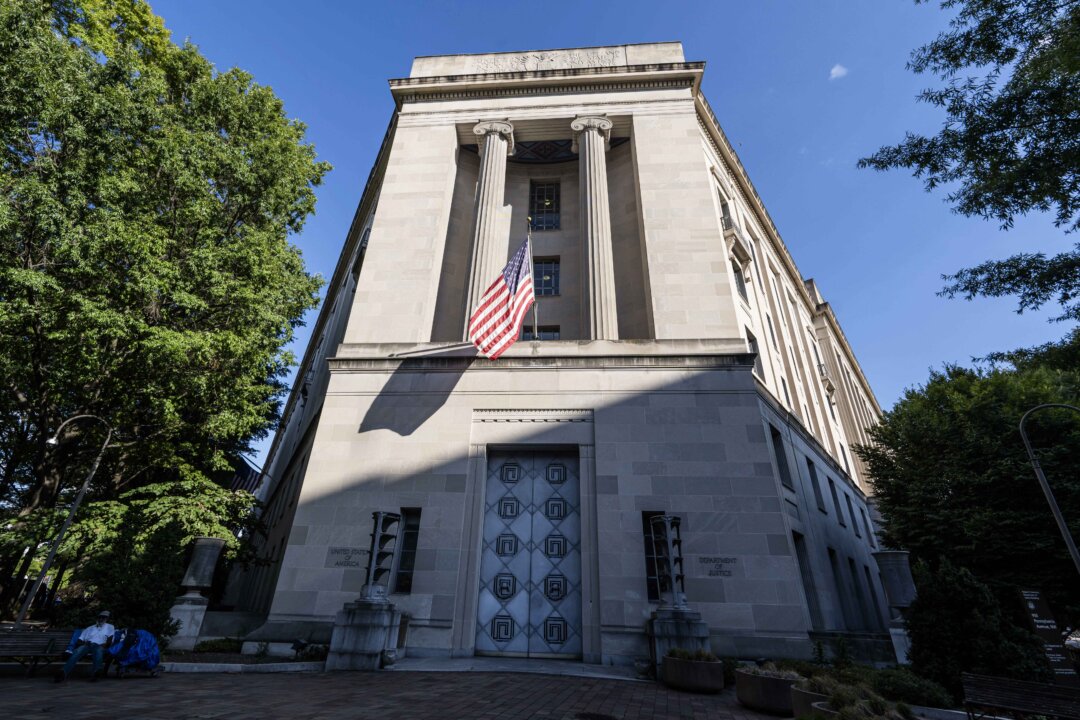It’s one of several announcements this week about DOJ’s programs handling election complaints about fraud, voting rights, and threats against officials.
The U.S. Department of Justice (DOJ) announced it would deploy its staff to a county in northeastern Ohio due to what it said were intimidation concerns.
“Voters in Portage County have raised concerns about intimidation resulting from the surveillance and the collection of personal information regarding voters, as well as threats concerning the electoral process,” the DOJ said in an Oct. 15 statement, without providing details about the allegations.
Staff will be sent to Portage County during the early voting period and during Election Day, on Tuesday, Nov. 5, the DOJ said.
In September, Portage County Sheriff Bruce Zuchowski wrote a social media post saying that if Democratic nominee Vice President Kamala Harris wins, people should write down supporters’ addresses to have illegal immigrants sent there. Zuchowski later took down the social media post.
It’s not clear if the DOJ was referring to the sheriff’s comments. The Epoch Times contacted the agency for comment.
Responding to the DOJ announcement, the Portage County Sheriff’s Office said in a statement that the “monitoring of voting locations/polls by the DOJ is conducted nationwide and is not unique to Portage County. This is a normal practice by the DOJ.”
Ohio is not expected to be a battleground state during the 2024 election. The state voted in favor of former President Trump during both the 2016 and 2020 elections.
Meanwhile, the agency has confirmed multiple points of contact for those who will be leading the efforts in connection with the agency’s Election Day efforts next month.
The DOJ issued numerous, district-specific news releases this week about the various U.S. attorneys’ office staffers who will lead the department’s efforts on Election Day, handling “complaints of voting rights concerns, threats of violence to election officials or staff, and election fraud,” according to one issued for the Northern District of New York.
“Federal law protects against such crimes as threatening violence against election officials or staff, intimidating or bribing voters, buying and selling votes, impersonating voters, altering vote tallies, stuffing ballot boxes, and marking ballots for voters against their wishes or without their input,” one of the DOJ statements said. Similar or the same wording was used in other DOJ news releases about the agency’s election-related efforts.
Such laws also have “special protections for the rights of voters and [provide] that they can vote free from interference, including intimidation, and other acts designed to prevent or discourage people from voting or voting for the candidate of their choice,” according to the agency.
The DOJ did not provide any specific examples of potential fraud in any of its announcements.
A DOJ statement Friday about its efforts in the Eastern District of Texas added that the FBI will have its “special agents available in each field office and resident agency throughout the country to receive allegations of election fraud and other election abuses on election day.”
The U.S. Attorney for the Eastern District of Texas Damien Diggs warned that people “who seek to corrupt” the U.S. election process will be “brought to justice.”
“It is important that those who have specific information about voting rights concerns or election fraud make that information available to the Department of Justice.”Meanwhile, top elections officials in at least two battleground states have issued warnings to county and local officials about delaying or tampering with the vote ahead of the Nov. 5 presidential contest.
Four years after the 2020 election, officials in several swing states recently said they will target county officials who they suspect are overstepping their authority. They said that any official could face criminal charges if they do not certify the election results next month.
“The law is clear and we won’t tolerate anyone not following it for any reason,” Michigan Secretary of State Jocelyn Benson, a Democrat, told Reuters in an interview published Friday. “There are times and places for challenging election results. The certification process is not one of them.”
Meanwhile, Pennsylvania Attorney General Michelle Henry, also a Democrat, told the newswire service that officials who do “not comply with the statutes, we will investigate that and there will be consequences.” He also said, “both criminal and civil actions … could be taken to maintain the integrity of the process.”
In a statement to the news outlet, Wisconsin Attorney General Josh Kaul, a Democrat, said that it is his office’s “expectation” that local election officials “follow the law” in the forthcoming election.
“If we receive concerns that that won’t be the case, we’re prepared to act,” Kaul said.
During the 2020 election, there were claims of election fraud—namely by former President Donald Trump and his campaign—in several battleground states, including Michigan, Pennsylvania, and Wisconsin, among others.
Reuters and The Associated Press contributed to this report.

